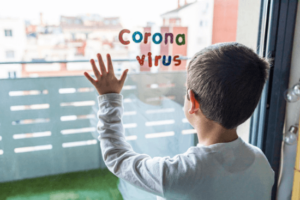There is a difference between panic and awareness. Awareness brings responsibility and respect, whilst panic is usually accompanied by fear and loss of control. Yet is the FEAR about COVID-19 that can spread like fire, create obsession and panic among our community.

You may be feeling anxious, overwhelmed, confused & out of control because there has been and continues to be much uncertainty about the Corona Virus. The day to day impact of CORONA is likely to be challenging for us for some time. There are many aspects about the COVID-19 pandemic that is unknown and regular media updates continue to remind us of this uncertainty, when they blast the news into our lounge room on a daily basis. If you would like to know more about how your mind processes complex information check out this page.
 These changes may mean that you may be working from home, managing home schooling, had a reduction of income, been put off from work or possibly had to close your business.
These changes may mean that you may be working from home, managing home schooling, had a reduction of income, been put off from work or possibly had to close your business.
People may be spending large amounts of time in close proximity and sadly for some people HOME may not be a safe place. If you are not safe at home these resources are available 24/7.
Financial pressures can create significant stress in our lives especially, if you have to apply for welfare for the first time in your life. It would normal to feel embarrassed and ashamed to apply for the Job Seeker allowance. To make things worse, though no-one is able when the situation will leave us and everything return to some sense of normal.
We all need to feel connected to people but COVID-19 has meant that we might be physically & emotionally distant from our loved ones. You may be separated from your family & friends because of social isolation, physical distancing requirements or border restrictions.
 Teenagers may be particularly vulnerable. During these years their brain is still developing so could be especially prone to distress and detachment from their peers.
Teenagers may be particularly vulnerable. During these years their brain is still developing so could be especially prone to distress and detachment from their peers.
Dealing with keeping up with high school subjects online, not attending school camps, Socials or Prom nights, school leavers means Teenagers may be socially isolated and without the support of their friends. It would also be normal for them to worry about what is going to happen about being accepted in College or University.

Parents and caregivers need to be aware how COVID 19 may be impacting younger children who might not have the cognitive ability to understand how and why their world is changing.
Children soak up information from social media, they overhear your discussions and pick up on adults emotions.
Their schooling and lifestyle may have been disrupted so it is important to be sensitive and open about why they are unable to go to school, have play dates or invite their friends over to celebrate their birthday.
It may be beneficial to share information in small amounts over time, so that the don’t become overwhelmed. Children generally need time to adjust and build up resilience to their new environment. Some children may also be fearful of wearing a mask. The below video gives some useful tips on how to encourage young children to wear a mask.
Australia is experiencing different levels of lock down in different hot spots, towns and state levels. It seems as though we are on a COVID-19 emotional roller coaster.
Whilst we need to take responsibility to be informed and being aware, if we constantly exposing ourselves to negative information about COVID-19 this will usually increase anxiety and stress levels.
 This is why it can be helpful to maintain habits that are intended to keep you healthy and safe, such as daily exercise, eating healthy food and good sleep.
This is why it can be helpful to maintain habits that are intended to keep you healthy and safe, such as daily exercise, eating healthy food and good sleep.
If you are caring for others, working from home or home schooling then it’s likely that you will have less time to look after your own needs. It is important fill up your own glass so that you are able to cope with these extra tasks.
 If you have more spare time it may be beneficial to return to some of those hobbies such as reading, gardening, cooking, sewing or even checking out new interests & hobbies on Youtube.
If you have more spare time it may be beneficial to return to some of those hobbies such as reading, gardening, cooking, sewing or even checking out new interests & hobbies on Youtube.
We all know that humans need to be connected so the introduction of new routines such as regularly zooming, face timing or calling friends & family can keep you in touch, giving each other encouragement plus a place to vent when needed.
Wear a mask in public if it makes you feel better or if your local situation requires you to do so, regularly wash your hands and undertake social isolation – this may be a temporary nuisance but it can also give you some certainty and reassurance.
We know that the world outside is uncertain but a time will come when we open our front doors,
boundaries, State & International borders. It’s impossible to really know how the world will be then but one day we will be able to leave the safety of our home. In an attempt to keep us safe, our mind is wired to notice the negative rather than the positives.
You may have been home for so long, that you may have lost some confidence, even developed some irrational fears or phobias. We’re unable to predict what the new “normal’ will be so some fears would be expected. But if any fears become irrational and prevent you resuming your day to day functions, then it is would be time to seek professional support.
This video provides some practical solutions adjusting to life Post Lock- down.
If you are struggling with the COVID 19 restrictions or maybe feeling a bit vulnerable at the moment, setting up an easy & convenient Zoom session from the comfort of your lounge room or study might be what just you need right now.
We offer Online One on One sessions to help people , just like you, develop practical strategies to leave those negative emotions behind so you can start to look forward with more confidence and certainty.
Hypnotherapy can offer a targeted & personal support to reduce
Post Lock-down Anxiety, helping you function and live better today.
Call us now and let the changes begin!
If your family, friends or yourself are in immediate risk of harming yourself or others, please contact the Emergency Services on 000 or call Lifeline on 13 11 14 who can provide 24/7 Suicide and Crisis Support. More contact details and support can be found on our Resources Page.